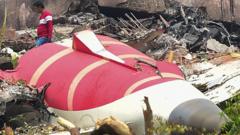India's Aircraft Accident Investigation Bureau (AAIB) is in the process of deciding whether to transport the flight data and cockpit voice recorders from the tragic Air India flight that crashed last Thursday for overseas analysis. The incident led to the loss of at least 270 lives, mainly among passengers, when the Boeing 787-8 Dreamliner, bound for London, went down shortly after taking off from Ahmedabad Airport in western India.
Despite some media reports suggesting that the black boxes would be sent abroad, India's Ministry of Civil Aviation has clarified that no definitive decision has yet been made. The AAIB is tasked with assessing the situation and will choose the location for analysis based on technical, safety, and security considerations.
Both sets of Enhanced Airborne Flight Recorders (EAFRs), commonly referred to as black boxes, were successfully recovered from the crash site on June 13 and June 16. These units play a crucial role in accident investigations as they record detailed flight data alongside cockpit conversations, providing insights into the final moments of the flight.
However, reports indicate that the black boxes might have sustained significant damage during the fire that followed the crash, potentially complicating data retrieval efforts if analyzed within India. Captain Kishore Chinta, a former investigator with the AAIB, noted that one set could be sent to the United States for comparison with data analyzed in India, particularly by the National Transportation Safety Board (NTSB). He added that while a new lab in Delhi has been inaugurated for EAFR data downloads, its operational status remains uncertain.
In related updates, Air India’s chairman mentioned that one engine of the crashed aircraft was newly installed, while the other was scheduled for servicing in December, both having a "clean" maintenance history. Following the tragic accident, India's aviation regulator mandated extra safety inspections on Air India's fleet of Boeing 787 aircraft as a precautionary measure. This led to the airline announcing reductions in flights across 16 international routes and the suspension of services to three overseas destinations from June 21 to July 15, attributing these changes to enhanced pre-flight checks and adjustments required by airspace restrictions in the Middle East.

















